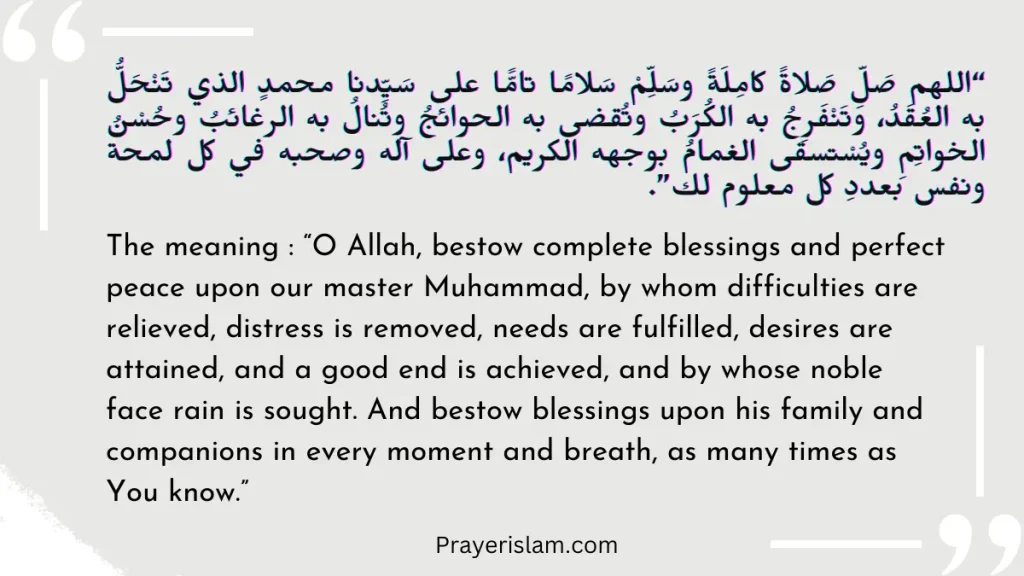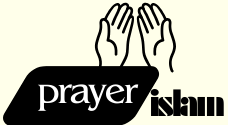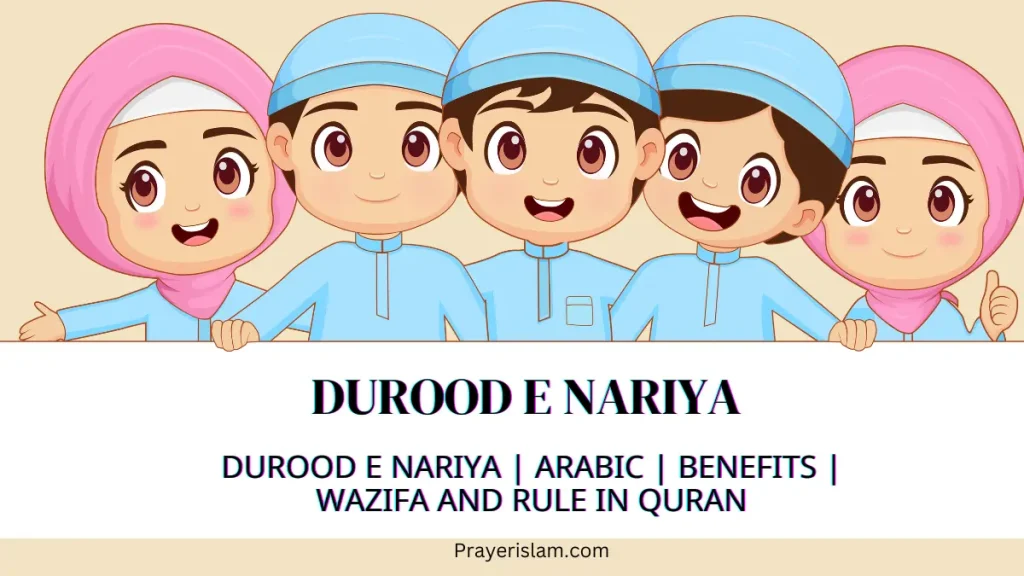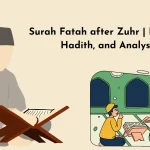Durood-e-Nariya is a well-known supplication that is popular in various Muslim countries. There are many controversies surrounding it, and different thoughts and opinions are prevalent among Muslims. In this blog post, we will discuss what Durood-e-Nariya is, its history, how to recite it, the number of times it should be recited, its legitimacy, and an analysis based on the Quran and Hadith.
What is Durood-e-Nariya: Introduction and History
‘Khatme Nariya’ or ‘Durood-e-Nariya’ is a specific set of phrases that, when recited 4444 times, completes this Khatm. It is believed that reciting this Khatm can ward off any danger and calamity. The name of this supplication ‘Nariya’ comes from the Arabic word ‘‘نار’’ which means fire. It is believed that just as fire ignites, this supplication removes obstacles and dangers.
The original Arabic phrases are:
“اللهم صَلِّ صَلاةً كامِلَةً وسَلِّمْ سَلامًا تامًّا على سَيِّدنا محمدٍ الذي تَنْحَلُّ به العُقَدُ، وتَنْفَرِجُ به الكُرَبُ وتُقضى به الحوائجُ وتُنالُ به الرغائبُ وحُسْنُ الخواتِمِ ويُسْتسقى الغمامُ بوجهه الكريم، وعلى آله وصحبه في كل لمحة ونفس بعددِ كل معلوم لك”.
Translation: “O Allah, bestow complete blessings and perfect peace upon our master Muhammad, by whom difficulties are relieved, distress is removed, needs are fulfilled, desires are attained, and a good end is achieved, and by whose noble face rain is sought. And bestow blessings upon his family and companions in every moment and breath, as many times as You know.”
However, where did this supplication originate from? Who was the first to discover it? These questions have many differing opinions. Durood-e-Nariya is a man-made supplication that does not originate from any specific Islamic source.
How to Recite Durood-e-Nariya
The rule for reciting Khatme Nariya or Durood-e-Nariya is to recite it at a specific time every day and in a specific quantity. It is generally recited 4444 times. Through this supplication, problems are solved, distress is removed, needs are fulfilled, virtuous deeds and a good end are achieved, and rain is sought.
Durood-e-Nariya: Arabic and Translation
The Arabic supplication of Durood-e-Nariya is:
“اللهم صَلِّ صَلاةً كامِلَةً وسَلِّمْ سَلامًا تامًّا على سَيِّدنا محمدٍ الذي تَنْحَلُّ به العُقَدُ، وتَنْفَرِجُ به الكُرَبُ وتُقضى به الحوائجُ وتُنالُ به الرغائبُ وحُسْنُ الخواتِمِ ويُسْتسقى الغمامُ بوجهه الكريم، وعلى آله وصحبه في كل لمحة ونفس بعددِ كل معلوم لك”.
Translation: “O Allah, bestow complete blessings and perfect peace upon our master Muhammad, by whom difficulties are relieved, distress is removed, needs are fulfilled, desires are attained, and a good end is achieved, and by whose noble face rain is sought. And bestow blessings upon his family and companions in every moment and breath, as many times as You know.”

Is Reciting Durood-e-Nariya Permissible?
No, reciting Durood-e-Nariya is not permissible. It is considered an innovation (Bid’ah). Credible scholars believe that reciting Durood-e-Nariya is not permissible because it is not found in the Quran or Hadith and is a man-made supplication. Moreover, those who recite it often do so for monetary gain, misleading people in the name of religion.
Evidence of Durood-e-Nariya as Bid’ah
Reciting Durood-e-Nariya is considered Bid’ah because Bid’ah refers to innovations in religion that are not related to the original teachings. The Prophet (SAW) taught the Sahaba the proper way to send blessings, but he did not instruct them to recite Durood in the manner of Durood-e-Nariya. No Sahabi (companion) recited Durood in this way.
The Prophet (SAW) said, “Every innovation is misguidance, and every misguidance is in the Fire.” (Muslim)
References from the Quran and Hadith
The importance of sending blessings upon the Prophet is mentioned in the Quran:
“إِنَّ اللَّهَ وَمَلَائِكَتَهُ يُصَلُّونَ عَلَى النَّبِيِّ ۚ يَا أَيُّهَا الَّذِينَ آمَنُوا صَلُّوا عَلَيْهِ وَسَلِّمُوا تَسْلِيمًا”
“Indeed, Allah and His angels send blessings upon the Prophet. O you who have believed, ask [ Allah to confer] blessing upon him and ask [ Allah to grant him] peace.” (Surah Al-Ahzab: 56)
The importance of sending blessings upon the Prophet is also mentioned in Hadith:
“مَنْ صَلَّى عَلَيَّ وَاحِدَةً، صَلَّى اللَّهُ عَلَيْهِ عَشْرًا”
“Whoever sends blessings upon me once, Allah will send blessings upon him ten times.” (Muslim)
The Sahaba (companions) practiced sending blessings upon the Prophet throughout their lives, but they never recited Durood in the manner of this Durood. Hence, it is considered an innovation (Bid’ah).
Durood-e-Nariya Benefits
Durood-e-Nariya is a special supplication that holds significant importance in various Muslim communities. While there are differing opinions on its legitimacy, many believers recite it with the hope of attaining various spiritual and worldly benefits. In this blog post, we will explore the benefits associated with reciting this Durood, both from a spiritual and practical perspective.
Spiritual Benefits
- Relief from Difficulties: Durood-e-Nariya is believed to be a powerful means of seeking Allah’s help in overcoming hardships and difficulties. By reciting this supplication, believers hope to find relief from their problems and distress.
- Fulfillment of Needs: Many people recite this Durood with the intention of having their personal needs and desires fulfilled. Whether it’s seeking success in endeavors, finding solutions to problems, or fulfilling specific wishes, this supplication is seen as a means to achieve these goals.
- Attainment of Peace: Reciting this Durood is thought to bring a sense of inner peace and tranquility. The regular recitation of this Durood helps in calming the mind and fostering a sense of spiritual well-being.
- Increase in Blessings: Sending blessings upon the Prophet Muhammad (SAW) is a means of attracting Allah’s mercy and blessings. By reciting this Durood, believers hope to increase the blessings in their lives and the lives of their loved ones.
Practical Benefits
- Strengthening Faith: The act of regularly reciting Durood-e-Nariya helps in reinforcing one’s faith and connection with Allah. It serves as a reminder of the importance of the Prophet Muhammad (SAW) in a believer’s life and encourages consistent worship.
- Protection from Harm: Many Muslims believe that reciting this Durood provides protection from harm and evil. It is recited with the hope of being safeguarded from physical, spiritual, and emotional dangers.
- Intercession on the Day of Judgment: Sending blessings upon the Prophet Muhammad (SAW) is believed to earn his intercession on the Day of Judgment. Reciting Durood-e-Nariya is seen as a way to secure the Prophet’s intercession and gain entry into Paradise.
- Spiritual Elevation: The regular recitation of this Durood is thought to elevate one’s spiritual status. It helps in purifying the heart, increasing spiritual awareness, and bringing one closer to Allah.
Commonly Believed Benefits
- Solving Problems: Many people recite this Durood to solve various personal and familial problems. It is believed that the blessings invoked through this Durood can help in resolving disputes and bringing harmony to relationships.
- Attaining Success: Whether in business, education, or personal endeavors, this Durood is recited with the hope of attaining success and achieving one’s goals.
- Health and Well-being: Some believers recite this Durood for health benefits. They hope that through this supplication, they can attain good health and well-being for themselves and their loved ones.
- Rain and Prosperity: Historically, this Durood has been recited to seek rain during times of drought. It is believed that the blessings invoked through this supplication can bring prosperity and abundance.
Conclusion
Durood-e-Nariya is a special supplication that is popular in various Muslim societies. Although there are differing opinions on its legitimacy, based on the Quran and Hadith, it is clear that sending blessings upon the Prophet is highly important. However, introducing new practices into the religion can be considered Bid’ah. Therefore, we should strive to follow the authentic teachings of the Quran and Hadith and keep our practices pure.
Frequently Asked Questions
1. What is Durood-e-Nariya?
This Durood is a special supplication recited to seek relief from calamities and distress.
2. What is the rule for reciting Khatme Nariya?
There are no specific rules for reciting this Durood, but it is often believed that reciting it 4444 times yields special results.
3. Is reciting Durood-e-Nariya permissible in Islamic Shariah?
There are differing opinions on this matter. Some scholars consider it permissible, while others regard it as Bid’ah.
4. What is the importance of sending blessings upon the Prophet in the Quran and Hadith?
The importance of sending blessings upon the Prophet is clearly mentioned in the Quran and Hadith, making it a highly significant practice for Muslims.
5. Why can Durood-e-Nariya be considered Bid’ah?
This Durood can be considered Bid’ah because it is an innovation in religion that does not have any basis in the original teachings of Islam.
I hope this blog post is helpful to you and provides a clear understanding of Khatme Nariya. We should strive to keep our practices pure and guided by the Quran and Hadith. May Allah guide us all on the right path.







